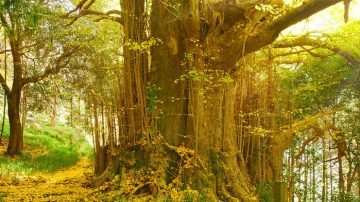Erin Malsbury in Science:

Long-lived humans having nothing on trees. Some, like the Ginkgo biloba, can live more than 3000 years. Now, in the most comprehensive plant aging study to date, researchers have revealed the molecular mechanisms that allow the ginkgo—and perhaps other trees—to survive so long. The new study provides the first real genetic evidence for something scientists have long suspected: “The default condition in plants is immortality,” says Howard Thomas, a plant biologist from Aberystwyth University who was not involved in the work. To make this bold claim, researchers started with thin cores from 34 healthy G. biloba trees in Anlu, in China’s Hubei province, and Pizhou, in Jiangsu province. (Excising the cores did not harm the trees.) Examining the growth rings, Li Wang, a plant molecular biologist at Yangzhou University, and colleagues discovered that the ginkgos’ growth didn’t slow down after hundreds of years—in fact, their growth rates sometimes sped up. What’s more, the leaf size, photosynthetic ability, and seed quality of the trees—all indicators of health—didn’t differ with age.
To find out what was happening at a genetic level, the researchers compared gene expression in leaves and the cambium, a thin layer of stem cells between the internal wood and external bark that differentiate into other tissues throughout a tree’s life. Because older trees have only a few layers of cambial cells, collecting enough material to work with proved difficult, Wang says. The team sequenced the trees’ RNA, examined hormone production, and screened miRNA—molecules that can turn specific genes on and off—in trees ranging from 3 years old to 667 years old. As expected, the expression of genes associated with senescence, the final and fatal stage of life, increased predictably in dying leaves. But when researchers examined the expression of those same genes in the cambium, they found no difference between young and old trees. This suggests that although organs such as leaves perish, the trees themselves are unlikely to die of old age, they report today in the Proceedings of the National Academy of Sciences.
More here.
